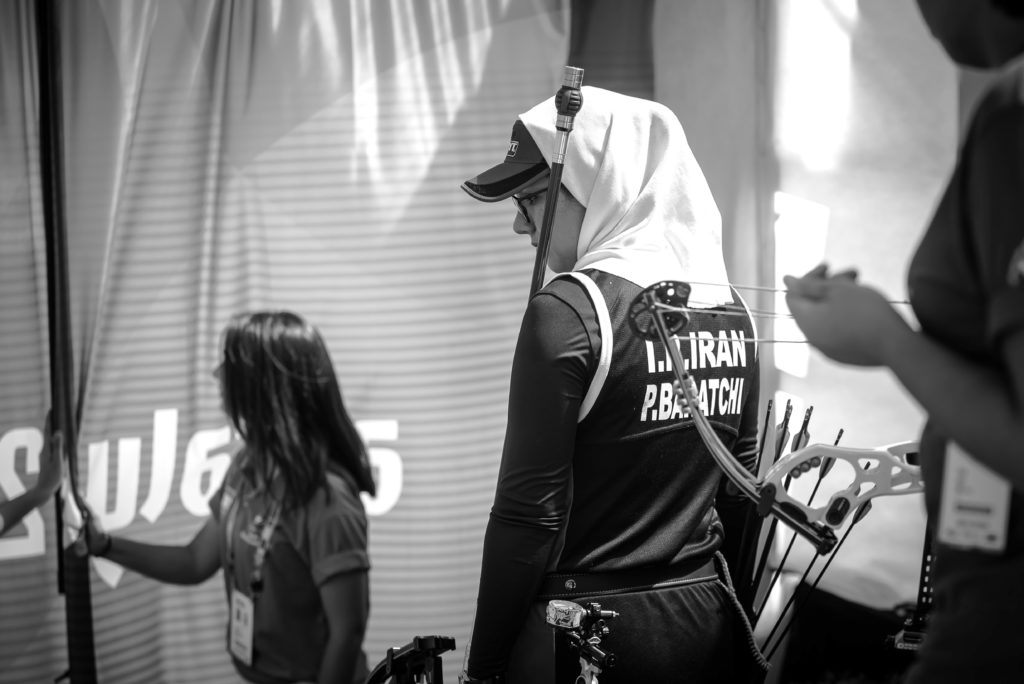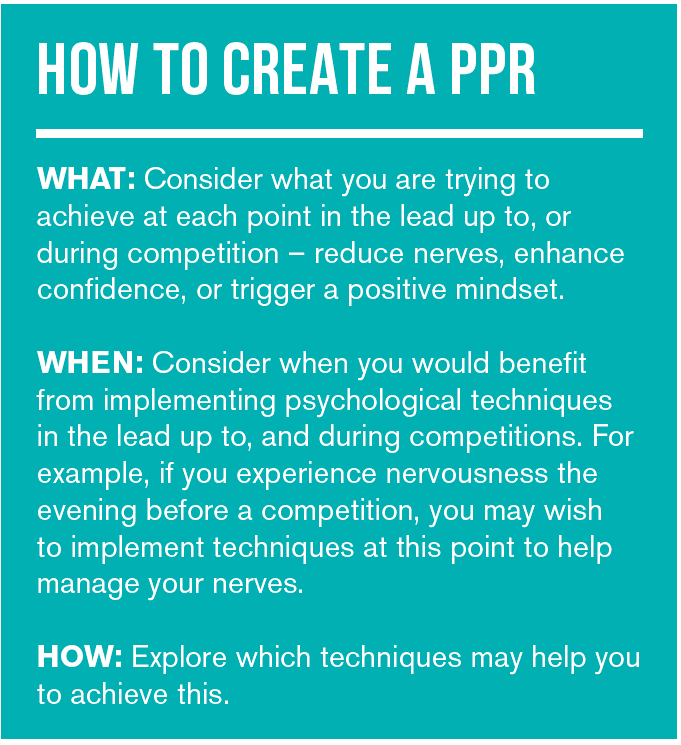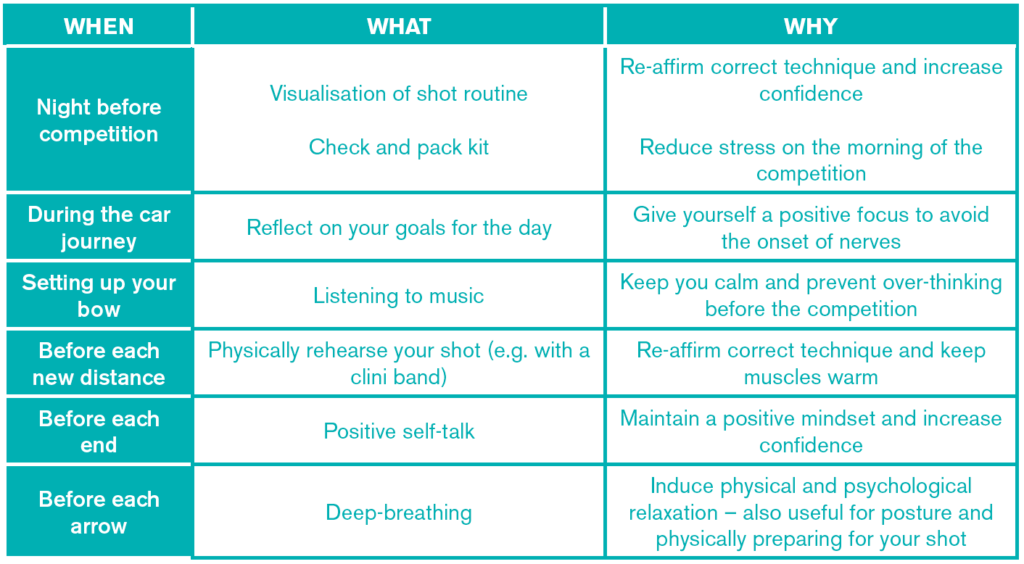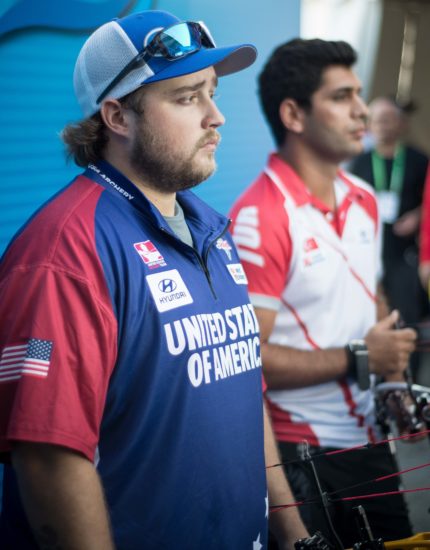Aiming for consistent performance? Say hello to pre-performance routines. By Erin Prior.
One of the key skills needed to perform successfully over time is consistency in preparation. This is particularly relevant in terms of mental preparation as many athletes neglect to take time to consider their mental approach.
By developing a consistent approach to mental preparation, archers can create a feeling of ‘readiness to perform’ and achieve their optimal mindset for effective performance. The simple way to do this is through a Pre-Performance Routine (PPR). This article will explore what a PPR is and how one can be developed, followed by an example routine to get you started.
A PPR is a sequence of mental techniques and actions for athletes to engage in prior to and during performance. The techniques and actions that make up a PPR can serve a variety of requirements. As an example, you may use techniques to increase confidence, decrease nerves and/or to induce relaxation.
PPR’s can also work as natural triggers to prompt focus and reduce the impact of distractions by encouraging task-relevant thoughts and actions. As an example, an archer may choose to visualise their shot routine to give them a positive focus, re-affirm their technique, and avoid focusing on feelings of nervousness.
PPR’s also encourage athletes to direct their focus towards their ‘process’ (i.e. technique and mental approach) rather than becoming too preoccupied with scores and results. By developing a focus on process, archers can reduce their nerves and increase their confidence as they are focusing on what they are able to influence.
This also enables archers to evaluate their performance not only based on score, but on the various other skills that are key to performing well – this ultimately enhances their progress and increases confidence levels.
PPR’s can also be implemented throughout competitions whilst you are shooting. If you are looking to use psychological techniques at this point, consider what you need to be able to execute a shot effectively – this could be physical or psychological (e.g. a positive mindset, staying relaxed, verbal encouragement). By doing this, you are considering the demands of the task and your desired outcome.
This will create a more personalised routine that is effective for you as an individual. Additionally, by understanding what you’re doing and why, you are able to monitor the effectiveness of your pre-performance routine.
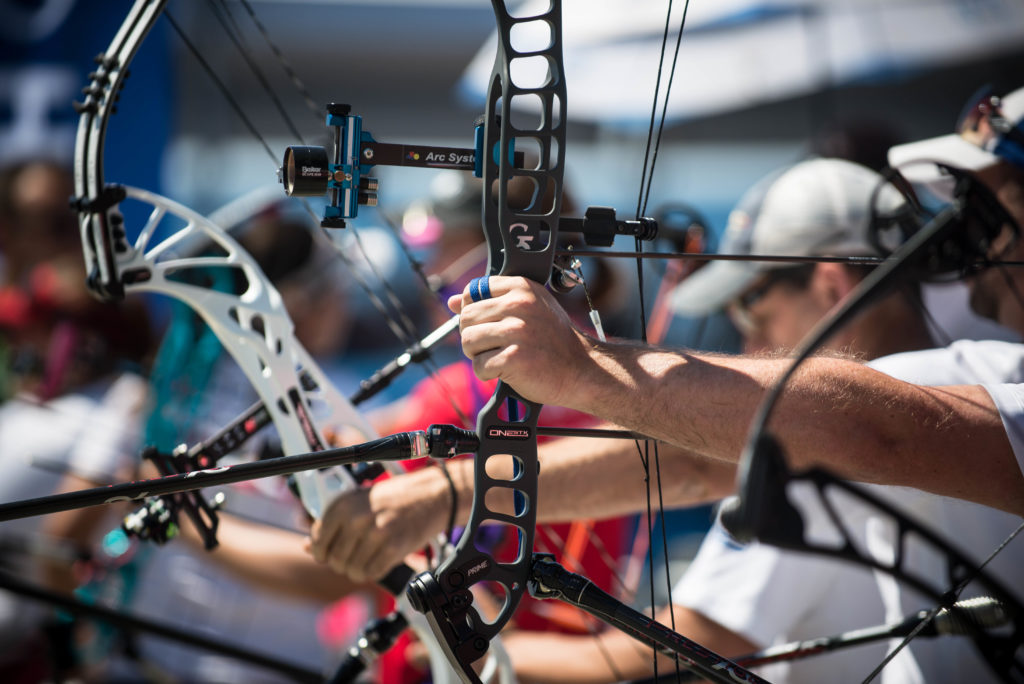
PPR’s … encourage athletes to direct their focus towards their process rather than on scores and results
Potential Components
Now for the important part; the potential components of a PPR. These are merely popular techniques to give you some ideas, feel free to add your own!
Physical:
- Physically rehearsing your shot
- Warming up your muscles
- Deep breathing to induce relaxation and reduce tension
- Progress Muscular Relaxation (PMR) which involves tensing and relaxing your muscles to induce physical relaxation.
Psychological:
- Positive self-talk
- Imagery/visualisation (this could involve visualising the correct shot routine, imagining a happy place or even visualising the competition and venue
- Writing down affirmations of what you are aiming to do/achieve
- Using music to increase motivation or induce relaxation
- Thought-stopping (1. recognise when you experience negative thoughts. 2. Develop a trigger to encourage you to stop those thoughts. 3. Replace the negative thoughts with positive).
- Reflecting on your goals and how you plan to achieve them.
- Reflecting on what makes you feel confident
- Thinking about what you are able to influence in the situation (eg. your technique, effort, and mindset)
Key Considerations
When creating your routine, try to use a combination of physical and psychological components. When using these techniques, be mindful of what you are trying to achieve.
It can be easy to get into a habit of using techniques and merely going through the motions, reducing their effectiveness as a result. Therefore, remain aware of what you are trying to achieve by using these techniques and if they become habitual and ineffective, try changing your routine to best support your performance.
Consistency of timing and use of components is key to an impactful routine. External factors can impact your ability to use your pre-performance routine but try your best to use it as consistently as possible to ensure optimal preparation. However, try to use your PPR as support rather than something you rely on.
Flexibility and resilience are just as important. By maintaining flexibility with your routine, you’re ensuring that it is a support, not a hindrance. Also keep in mind that your routine is a method of preparing you for performance, therefore, avoid merely adopting your routine as a remedy when you are experiencing negative performance.
You may be surprised by the effectiveness of some techniques. Be open-minded and try out different techniques to really explore what works for you. Get creative and use the techniques listed in this article as a guide, but also add your own ideas to make them personal for you as an archer and an individual – what works for one archer, may not work for another.
Experimentation when first creating your routine is key to maximising its effectiveness, and this experimentation doesn’t stop once you have formed your routine. Over time, your preparation and requirements may change – don’t be afraid to adapt your routine to suit your needs!
Finally, if you create a routine that successfully supports your mental and physical preparation for training and competitions, hopefully you will see some positive improvements in your performance. But don’t let these improvements stop you from continuing to use your routine. Your routine is a support mechanism, not a cure. Therefore, continual use, however you are performing and feeling is key.
So, next time you’re approaching a competition, stop and consider if you are psychologically prepared for the event. By taking the time to plan your mental preparation as well as your physical preparation, you are giving yourself the best opportunity for success out on the field!
Erin Prior MBPsS is a Trainee Sport & Exercise Psychologist who has worked with the likes of the FA, Swim England, Loughborough University and Aston Villa Football Club.
If you’re looking to enhance your mindset to improve your performance, get in touch: EPSportPsychology@gmail.com


